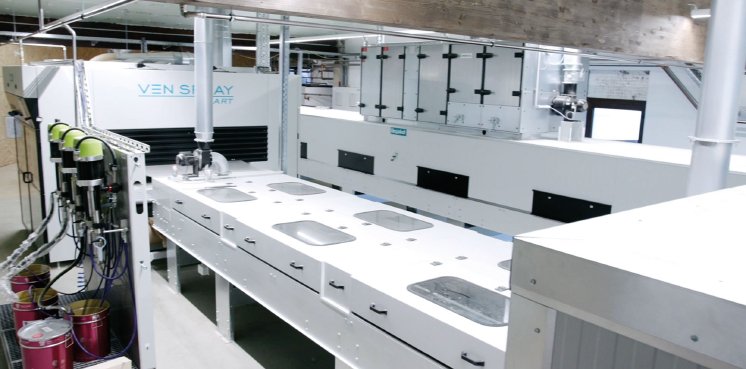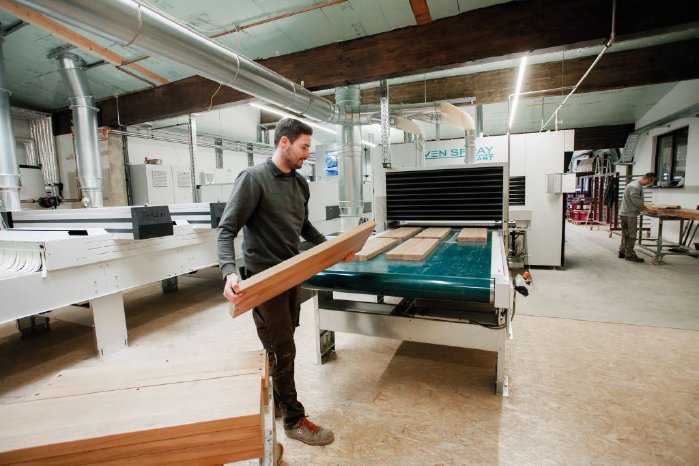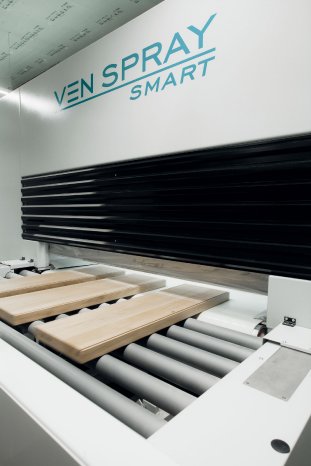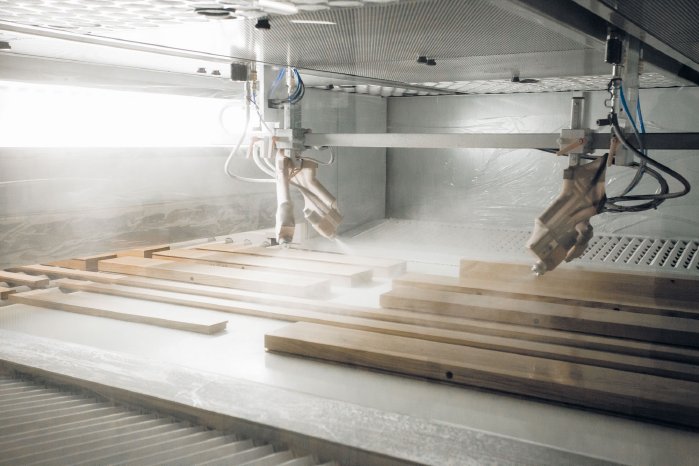"We are making the company future-proof for the next generation." The medium-sized family-run business ETS Treppenbau und Schreinerei GmbH currently employs 26 people at its Dingdorf site in Rhineland-Palatinate. ETS is one of the enviable workshops that does not have to worry about company succession. In addition to the managing directors Albert and Klaus-Peter Ernzer, the three sons are already working in their parents' business – two of them, Jonas and Lukas Ernzer, already have their master craftsman's certificate "in the bag". The company specializes in the construction of wooden stairs, mainly for private customers, prefabricated house builders and carpentry workshops.
First considerations for automation
"Stairs that inspire" is the traditional company's motto. Their strength is bespoke stairs made to customer requirements. The Ernzers are known for this and highly recommended across the region. However, they are also feeling the effects of the shortage of skilled workers. "You need to find good painters first," says Alfred Ernzer. "That's why we started thinking about automating the surface treatment process," adds Klaus-Peter Ernzer. During the decision-making process, quality enhancement and time savings were the most important factors for the Ernzers. "Our customers increasingly want the surfaces of their stair treads to match the interior – especially the color of the existing floors. For this purpose, colored stains or RAL colors are used as water-based UV coatings, which we were previously only able to apply on the manual spray booth," reports Alfred Ernzer. The roller coating system available at the plant could only be used to apply clear coat. "Here, too, we had to lend an extra hand for coating the edges," says Ernzer, describing the overhead that is now a thing of the past – much to everyone's delight. With the new coating system from Venjakob, everything can be coated, stained, and dried in equal measure. "The entire finishing line – from the spray coating machine with three coating supply lines to the UV drying channel – is designed to use the desired water-based UV coatings and water-based stain, while complying 100% with EU environmental directives. Regarding time savings, Alfred Ernzer says: "We could now easily paint twice as many stair treads."
First large order for chipboard received
But the vision is different. The new Venjakob finishing line, which is precisely tailored to Ernzer's needs, is to be utilized for more than just their own stairs. "We want to accept more third-party finishing orders for furniture construction," says Klaus-Peter Ernzer. The first major order has already been received: 5000 sqm of chipboard for interior construction are to be painted. The system, which allows fast color changes and has short drying times, is predestined for this. Ernzer is also impressed by the surface quality. "UV curing, which can now be used for the colored surfaces, makes the coating much more robust and scratch-resistant."
System suitable for new hall construction
In the future, the surface treatment process should take place in a separate hall. A new hall, with an area of approx. 500 sqm, was planned for this purpose. The ceiling height was low because the hall was built directly onto the existing workshop at the same height. Accordingly, the coating line should be designed to save space. The entire system from Venjakob was built in a U-shape with rake angle transfer. Workpieces can be machined with the following dimensions in length, width, and height: minimum 300 mm x 100 mm x 10 mm, maximum 5300 x 1300 x 100 mm.
15 minutes for a complete run
The system is structured as follows: The workpieces are placed manually on the belt conveyor. Length markings for the workpieces were applied to make things simpler. First, the workpieces are automatically preheated with the dust removed via an IR preheating module. They are then transported to the Ven Spray Smart spray coating machine. This is equipped with one coating supply line each for UV clear coatings, UV color coatings, and for stains. Painting is performed with four spray guns, which coat the surfaces and edges equally. After coating, the workpieces are transported by a temperature-resistant belt conveyor through a covered evaporation zone into the drying channel heated with water. This consists of two nozzle drying channels built on an angular transfer for transferring the batches. In the subsequent UV drying channel, the workpieces coated with clear or colored coatings are cured. "The goal was for the workpieces to come out of the system dry after being primed with paint or clear coats, so that the intermediate sanding of the paint and then the top coat can take place," explains Christian Schulze, the sales engineer at Venjakob who supports the customer ETS. The time for a painting run from the placement of the workpieces to acceptance is around fifteen minutes.
Expertise and good reputation crucial
The system can be easily controlled via a central operating unit, which is used to access coating recipes that have already been stored. "All important parameters, such as drying times, are stored in the recipe management. We carefully coordinated these parameters with the customer and the paint manufacturer," says Christian Schulze.
Ernzer agrees that the investment has paid off. "Yes, there were less expensive offers. However, the crucial factor for us was the expertise of the Venjakob employees and their great reputation. The system was perfectly planned and implemented according to our needs. The cost-effectiveness suits such a system," confirms Alfred Ernzer.





